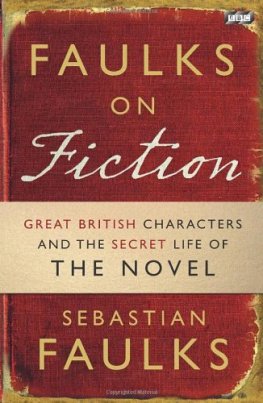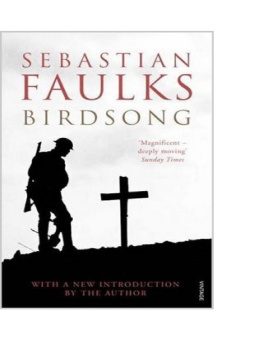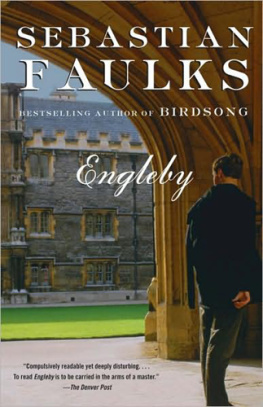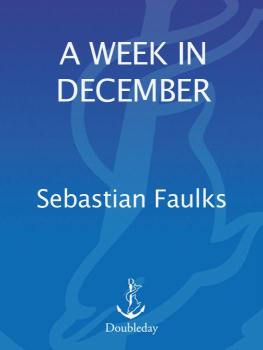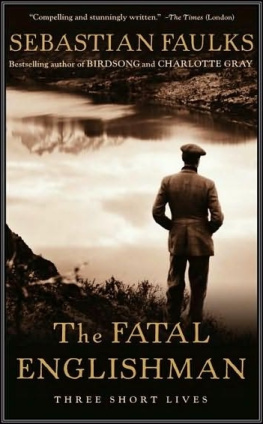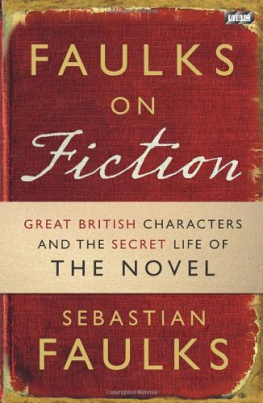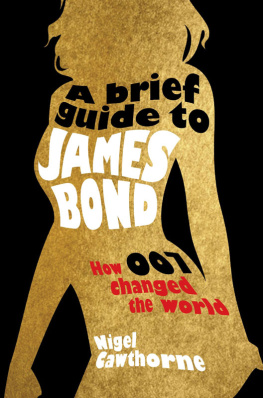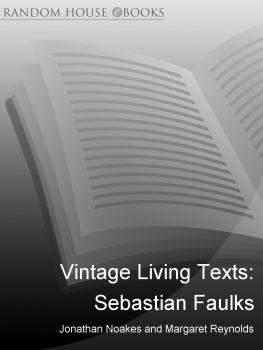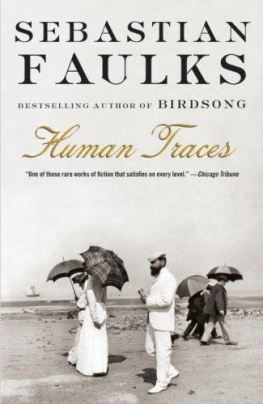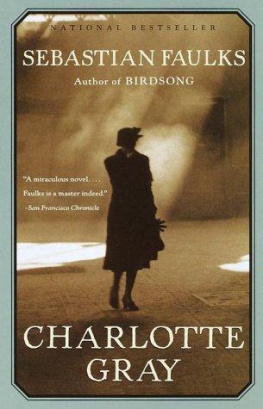VINTAGE CLASSICS EBOOKS INCLUDED WITH FAULKS ON FICTION: VILLAINS

CHARLES DICKENS
Oliver Twist
Charles Dickens is one of the giants of English literature Sunday Express
Oliver Twist, born into tragedy, runs away to London with the naive hope for a brighter future. In this classic, Dickens graphically conjures up the capitals underworld, full of prostitutes, thieves and lost and homeless children.

WILKIE COLLINS
The Woman in White
Notable for its marvellous villains and, like all Collins's work, for its complex, spirited and believable female characters Sarah Waters
Marian and her sister Laura live a quiet life under their uncles guardianship until Lauras marriage to Sir Percival Glyde, a man of many secrets. Can she be protected from a mysterious and potentially fatal plot?
VINTAGE BOOKS
London
www.vintage-books.co.uk
CONTENTS
Sebastian Faulks
FAULKS ON FICTION
GREAT BRITISH VILLAINS
AND THE SECRET LIFE OF THE NOVEL

This ebook is sold subject to the condition that it shall not, by way of trade or otherwise, be lent, resold, hired out or otherwise circulated without the publishers prior consent in any form (including any digital form) other than this in which it is published and without a similar condition including this condition being imposed on the subsequent purchaser.
Epub ISBN: 9781446416297
Version 1.0
www.randomhouse.co.uk
This book is published to accompany the television series entitled Faulks on Fiction , first broadcast on BBC2 in 2011.
Executive Producer: Basil Comely
Series Producer: Mary Sackville-West
1 3 5 7 9 10 8 6 4 2
Published in 2011 by BBC Books, an imprint of Ebury Publishing.
A Random House Group Company
Text Sebastian Faulks 2011
Sebastian Faulks has asserted his right to be identified as the author of this work
in accordance with the Copyright, Designs and Patents Act 1988
All illustrations Mary Evans Picture Library 2011
The Random House Group Limited Reg. No. 954009
Addresses for companies within the Random House Group can be found at
www.randomhouse.co.uk
A CIP catalogue record for this book is available from the British Library.
Hardback ISBN 978 184 607959 7
Export ISBN 978 184 990002 7
Lhomme nest rien, loeuvre tout.
The authors life is nothing; its the work that matters.
Gustave Flaubert in a letter to George Sand, December 1875.
INTRODUCTION
To a large extent the villain, like the hero, is out of place in the novel. While the hero came from epic poetry, the villain sprang from the theatre. As realism became the dominant form in fiction, however, his histrionic ways began to become an embarrassment; that he survived at all is a testament to how useful he could be.
In a novel, the villain is the one who knows whats going on; he has the gen; he holds the keys to the plot, in both senses of the word. Barbara Covett in Zo Hellers Notes on a Scandal not only manipulates her victim, she literally controls the story for the reader: The task of telling it has fallen into my hands. Fosco in The Woman in White demonstrates the glamour of superior knowledge; the challenge for Wilkie Collins was to retain or release the details of what Fosco alone knows in a way that kept his readers agog. Fosco is also a foreigner, which lends him extra mystery: he may have weird Continental powers (chemistry, Mesmerism...) that will be beyond his English adversary, Walter Hartright. Whats more, Fosco is a count a title that doesnt exist in Britain but was much favoured for villains, including Bram Stokers Count Dracula and the villain of Ann Radcliffes Gothic novel The Mysteries of Udolpho , Count Montoni.
The villain is a seducer. Sometimes, as with Fagin, this is in an asexual way he seduces Oliver Twist with laughter, food and occasional kindness. Long John Silver in Treasure Island seems to be a kind of hypnotist: He fixed his unfathomable gray eyes on me, with that cold, clear, irresistible glitter in them... An unutterable suspicion that his mind is prying into mine overcomes me at these times.... With Fosco, it is the sexual fascination he has for his most worthy adversary, Marian Halcombe, that prevents her from seeing his deviousness more clearly. In Robert Lovelace, Richardsons villain in Clarissa , sex is the explicit driving force for a million words of seduction and rebuff. However, Lovelaces schemes for sleeping with Clarissa Harlowe so thrilled the readers of the novel that Richardson had to rewrite the book to underline Lovelaces immorality. There is always the danger that the villain will be so attractive to a reader hungry for intrigue that he will suspend his moral judgement and so thwart the high-minded author. It was quite a coup, I always felt, that Howard Kirk, the apparently irresistible seducer of Malcolm Bradburys novel The History Man , remained in all ways repulsive to the reader.
Villains often have not only the power of knowledge and sex but of language, too. Lovelace is high on poetry for much of the time. Richardson consulted an anthology of verse to keep the quotations coming, and it sometimes seems that Lovelace needs this rhetoric to maintain the heat of his desire. Humbert Humbert in Nabokovs Lolita relies on his high-flown language to make his illegal urge seem tenable. Barbara Covett uses tart phrasing to expose the vacuity of her colleagues and of her prey.
When I wrote a novel called Engleby in 2005, I didnt know when I began it that Mike Engleby, the narrator, was going to be a villain. I knew that his voice was not quite right, like a radio turned slightly off-station, but I had no idea where he was taking me. Readers reactions brought home to me the different standards they apply to people in books. One reader told me she loved Mike Engleby. I said, Well, its fine to sympathise until you find out what hes done. No, she said. Even when I found out, I still liked him.
At the start of the twentieth century, the dramatic inheritance of the villain became more cumbersome, as a value system emerged that was based on new ideas of psychological exploration. If every human motive could be explained, the idea of villainy could look clumsy. In France, Emile Zolas novels adhered to a dogma of character determined by social circumstance, and this made moral distinctions marginal; while in Emma Bovary, Flaubert had already presented a day-dreaming adulteress as a person to be viewed not as a caution but as a fascinating and suggestive case. Zolas Thrse Raquin in 1867 told the story of a woman who, with her lover, murders her husband, but tried to present her as a scientific case study. Mauriacs Thrse Desqueyroux, in the 1927 novel of the same name, tries to poison her husband, but the stifling nature of her marriage and the dreaded life of the bourgeoisie were presented as exculpation. In some ways these are post-moral books; they are certainly post-religious.
The idea that a criminal should be explained found few takers among British novelists, which is puzzling when you consider that the natural drama of such a situation the tension between outer and inner life, between social norm and personal reality was elsewhere the mainstay of the serious novel. For British writers, the villain tended to remain the servant of the plot, the instigator of the action par excellence. In Paul Scotts Raj Quartet, Ronald Merrick is a post-Freudian villain. He is a bad man, but he is bad for given reasons; he has, in fact, a complete psychopathology and is presented to us as someone wholly explicable in these terms. This is clearly quite different from Fagin or Fosco, where we are not given any childhood experience or analysis of motive. The shape of Merricks darkness is not ours, but it finds an echo. We all know that the distinctive shapes of our personalities our strengths as well as our desires and weaknesses could, in the wrong circumstances, become deformities. The interesting thing about Merrick, however, is that although he is a modern character in the tout comprendre, cest tout pardonner sense, Paul Scott does not actually ask us to forgive. Merrick, for all the scrupulousness with which Scott makes his unconscious and conscious desires known to the reader, remains a villain.
Next page
